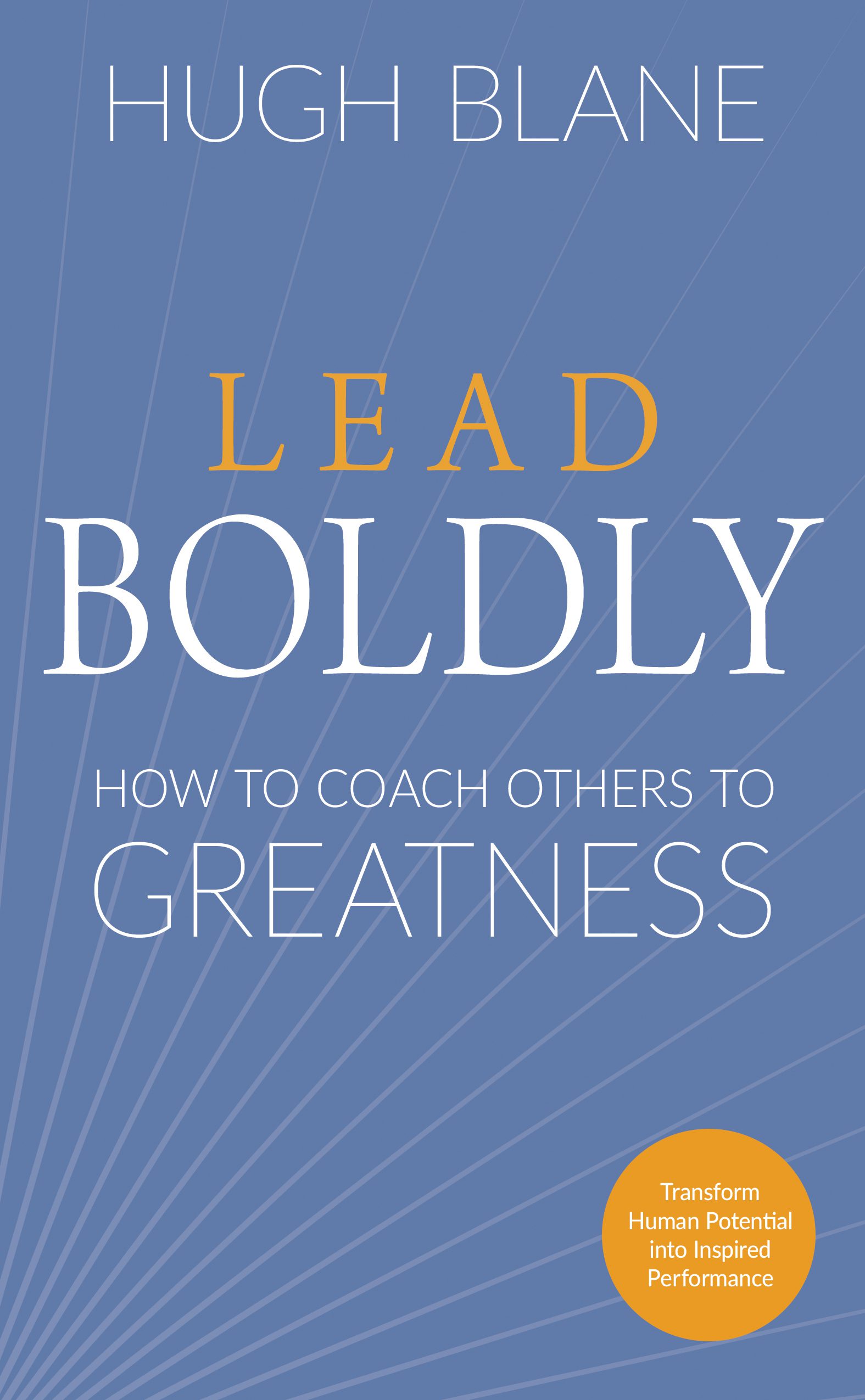An Excerpt from “Lead Boldly” by Hugh Blane
“That’s the beauty of coaching. You get to touch lives. You get to make a difference.”
—Morgan Wootten
I can count on one hand the number of people who have had a transformational impact on my life. My parents certainly did, but a very close second (and the catalyst for my professional life today) was David Litton, my junior high school track coach.
Coach Litton changed the trajectory of my life. That’s not hyperbole. In a very real way, he entered the life of a skinny, troubled immigrant kid and planted the seeds of what was possible, the power of perseverance, and even the idea of pursuing excellence. I didn’t possess those attributes before being coached by him, but the fact that he had planted the seeds of greatness in me is a testament to his impact.
I wasn’t raised with greatness in mind. I was raised with a mindset of adversity, anxiety, and poverty by an immigrant family that was struggling to survive. My family came to the United States in 1968 with no furniture, little luggage, and great hope that we could recover from the financial reversals we had suffered in Scotland. My father’s business had bankrupted our family. By the time three men knocked on
our front door to repossess our furniture, we were broken financially, emotionally, and, in some ways, spiritually. For us, immigrating was not so much about moving to the United States as it was about running away from the embarrassment of having been reduced from an upper-middle-class lifestyle to one dependent on family and friends for survival. This experience left my parents rightly focused on making ends meet, but with little energy left to attend to the emotional and psychological needs of their two young children.
We arrived in Birmingham, Alabama, in 1968, five years after Bull Connor had used fire hoses on protestors and the bombing of the 16th Street Baptist Church. I entered Our Lady of Sorrows Catholic school on the same day that four African-American girls crossed the integration barrier and enrolled there. I stood on the sidewalk with fifty other students curiously watching as these girls crossed the courtyard to enter the building. On this, my first day of school in America, I experienced prejudice and the civil rights movement up-close and personal. And I found myself closely aligned with the four girls crossing that invisible barrier of belonging because I, too, was crossing into the unknown and was eager, if not desperate, to fit in with the other kids at school.
In my first two years at school, my schoolwork was well below average. I felt out of place and unable to focus. I spent more time in the principal’s office than at my desk. I had a nervous and insatiable need to talk when I was told to be quiet.
In hopes of being included and accepted, I befriended other troubled kids. I found a group of boys as unfocused as I was who were rebelling against being told what to do. On a dare from one of my new friends, I stole lunch tickets from a teacher’s desk and scalped them for half price. It was a simple transaction. Your parents gave you $2.00 for your weekly lunches. I’d sell you a ticket for a dollar. You kept a dollar and so did I. After two weeks, I visited the principal’s office and was found to have $65.00 in cash. I thought I was entrepreneurial, but the school principal called me a thief. She was right, and I was expelled from school.
I was then enrolled in a public junior high school, where I quickly realized how much safer Catholic school had been. Here, fitting in and becoming a part of the group was a fullcontact sport. I tell you all this to provide context and help you understand where my young life was headed, and why Coach Litton’s lifeline changed my trajectory so dramatically.
RUNNING FOR MY LIFE
One day in gym class, the football coach lined up all the boys in a large horseshoe and instructed the two boys at the top of the horseshoe to compete in a forty-yard dash. I’m not sure if I was smart or nervous, but I counted the number of kids in front of me to see who I was going to race against. To my shock, I saw my “competitor” was Moses, the star running back on the football team. I only knew him from seeing him walk the halls of school, where kids called his name wanting to be seen as his friend. When my eyes met his, Moses was beaming with a confident and arrogant smile. From forty feet away, it was clear how much he would enjoy devouring this scrawny kid. The likely fear on my face made this all the more delicious for him.
I started brainstorming excuses for why I couldn’t run. I had an upset stomach. Nope. I felt sick and needed to go to the bathroom. Nope. How about, I want my mom! Eh . . . no, that won’t work. As a Catholic, I thought of the Old Testament sacrifices and felt like a lamb going to the slaughter. I believed I was going to be sacrificed by the football coach, by Moses, and by all of the other boys for the laugh of the day. There was nowhere to hide.
After ten fear-wracked minutes, I found myself face to face with Moses. I remember he had the broadest smile and the whitest teeth. He was a god, and hearing his laughter as he contemplated racing me was humiliating. The football coach started laughing as well, as did the other boys. Then the coach picked up his stopwatch and asked if we were ready, to which Moses responded loudly and triumphantly in the affirmative.
I had no talent or skill for running. I was good at running away from responsibility, but that was it. As time slowed to a standstill, I felt a physical pain of sorts standing next to Moses. I couldn’t catch my breath, but I remember bracing myself on the starting line and staring ahead. At the command to go, I felt as if I had been shot from a cannon. I was running to get the race over with. I wanted the embarrassment to end. So I ran away from it and the laughter of seventy-five boys and the devouring gaze of Moses. I ran my ass off. And so did he. But over those forty yards, Moses never pulled ahead of me. Miraculously, I crossed the finish line before he did.
Think for a moment about what had happened. Some scrawny kid (and I mean scrawny!) raced and beat the star running back. Compare this to a souped- up Honda Civic beating a Porsche 911 in a quarter-mile sprint. The disbelief was palpable. Disbelief from Moses, who certainly wasn’t accustomed to losing. Disbelief from the football coach, whose star running back had just been beaten. Disbelief from the other boys, because their hero had been bested. And most profoundly, disbelief from me that I hadn’t lost.
The momentary “Holy smokes, I didn’t lose” moment was quickly replaced with the thought that I must have jumped the gun. I must have goofed up somehow. This was confirmed when the coach barked: “Let’s see if you can do that again.” As we walked back to the starting line, Moses was no longer laughing, but looked confused. The other boys weren’t laughing either, but asking: “Who is this kid?” I was simply wondering what had just happened.
I won the second race, although by a smaller margin than the first, which enraged the coach, who yelled that we had to race again. As we returned to the starting line, I could feel the anger radiating off Moses. After I had beaten him for a third time and was hoping desperately that there wouldn’t be a fourth race, Coach Litton stepped into the fray and suggested that the football coach give some of other boys a chance to run.
TAKING THE WIN
At first, my unlikely victory over Moses didn’t turn out to be a victory for me. I had alienated Moses’s friends and the other members of the football team. I was too small to play football, so I was of no value to the football coach. For the remainder of that ill-fated gym class, no one spoke to me or congratulated me. I felt more and more like an outsider. I felt responsible for embarrassing Moses and, in some perverted way, for causing him pain. Aware that I had no allies and no one with whom to share my success, I spent the rest of that day trying to avoid talking about what had happened and waiting to use my newfound speed to run home.
But Coach Litton was waiting for me as I walked out of my last class. “I think you’ve got a lot of potential as a runner,” he said. He told me that I had done something really special that day by winning three races against Moses. Then he commented that, with a little coaching and training, I could excel at running track and suggested that I join the track team. Feeling I had nothing to lose, I decided to give it a go.
This was a transformational moment for me. Coach Litton did what great coaches do. He saw something in me that I couldn’t see in myself and committed to bringing out the best in me on the track. He understood my circumstances as a troubled immigrant kid, my academic struggles, and my lack of friends. He raised the bar on what I thought I could accomplish and helped me to feel a part of something special.
I’m telling you this story to illustrate how one individual can change the trajectory of another’s life. Coaching, when done in the way that Coach Litton worked with me, doesn’t impact just one person’s life. It affects the lives of all of the people with whom that person lives and interacts.
The coaching I received from Coach Litton has shaped and informed the businesses I have run. He influenced the relationships I have with my family, my friends, and my coaching clients, as well as with the community where I live and work. He inspired me to pursue excellence and, in the process, to become the very best version of myself. He taught me a set of values and principles that still helps shape me today and that enables me to show my clients how to rise up and live abundantly. His coaching was a gift given to me at a time when I needed it the most. I now share this gift with you, as I believe that we, as a culture, are in need of it now more than ever.
QUESTIONS
As you reflect on the story of Coach Litton, think about how similar experiences you may have had in your own life have changed you—for better and for worse.
- Who are the three most influential people you’ve
- known and what did they do that changed the trajectory of your life?
- How do you pay forward what they taught you?
- How have your relationships with these people shaped
- your definition of greatness?
With your answers in mind, let’s now take a closer look at what it means to love deeply.
—Hugh Blane, Chapter 1, Be a Difference Maker, Copyright © 2024
Featured Book
Lead Boldly
In “Lead Boldly,” peak performance coach Hugh Blane shares his three guiding principles for converting human potential into inspired performance. He does this by providing a detailed road map for transforming a leader’s results at work and home in unprecedented ways.

